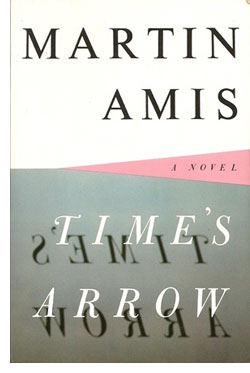 |
 Martin Amis
Martin Amis
Time's Arrow
Reviewed by: Rick Kleffel © 2011
Harmony Books / Crown Publishing
US Hardcover First Edition
ISBN 978-0-517-58515-4
Publication Date: 10-23-1991
168 pages; $18.00
Date Reviewed: 02-28-1992
Index:
General Fiction
Fantasy
Horror
Science Fiction
Every once in a while, there's a prize-winning, well-written novel released to critical acclaim that's also readable. This year, that novel has got to be 'Time's Arrow' by British writer Martin Amis. It's the remarkable, intense, imaginative and eminently enjoyable story of Tod T. Friendly, an American doctor working in an unnamed hospital in an unnamed city. The story is told from the point of view of a sort of doppelganger spirit, imprisoned within the body and mind of Friendly, who detects Friendly's emotions, but cannot affect Friendly's actions.
Oh, and the doppelganger experiences Friendly's life backwards, starting with his death, and ending with his birth. The novel that emerges from this premise an an incredible feat of storytelling, beautifully easy to read, swimming with visual images and so startling that it can stare unflinchingly at what is certainly the ultimate horror of the twentieth century and still somehow be entertaining.
I must admit that I was a bit daunted by this novel. I was first told about it by a Vice President of Engineering who doesn't read much fiction, but had heard Friendly's description of the cab service in New York:
"This business with the cabs, it surely looks like an unimprovable deal. They're always there when you need one, even in the rain or when the theatres are closing. They pay you up front, no questions asked. They always know where you're going. They're great. No wonder we stand there, for hours on end, waving goodbye, or saluting- saluting this fine service. The streets are full of people with their arms raised, drenched and weary, thanking the yellow cabs. Just the one hitch: they're always taking me places where I don't want to go."
Despite this very amusing anecdote, I remained wary, and was made even more so when I heard that the novel had won a Booker Prize in England. Fortunately, I overcame my innate fear of quality, and, in an orgy of spare-cash spending, I bought the novel , then promptly filed it away while pursuing more "rewarding" reading, that is, stories about dead people coming to life and the like.
Time passes. I get kind of glutted on gore, see this slim volume on my shelf, and gritting my teeth, take it down to read something that's "good for me". One day later, it's history and I'm happily typing this review, because this isn't one of those books you read like lightning, then put down and pick up the next "novel lite". It'll take you a while to stop seeing everything backwards.
While the narrator is amused by the perfections of cab service, he's not amused by Tod's day job in the hospital. For him, it seems to be an atrocity mill, where relatively healthy people are dissected by doctors, then packed into ambulances and sent to random parts of the city. The narrator develops a hatred for doctors, but soon begins a name-changing journey towards what he comes to see as his soul's salvation — a job converting the ashes of Jews back into whole humans in a miraculous place called Auschwitz.
Amis' descriptions are crisp, readable and clear. Most importantly, he allows the reader to digest the unthinkable, to come to terms with horror on a scale not approached by King and Barker. He doesn't hammer you and he doesn't lecture, but slowly and surely you are filled with a knowledge that you wouldn't think your mind could contain. And it's so darn readable that you won't be able to stop until the shockingly sweet finale. Never has happiness felt so full and been so fully compromised by a novel. Yes, it's true. I've been shot by 'Time's Arrow.'
|
 |




